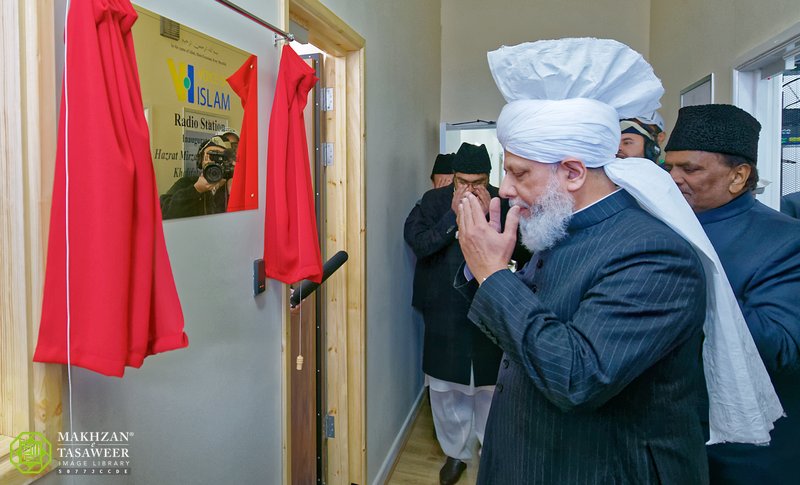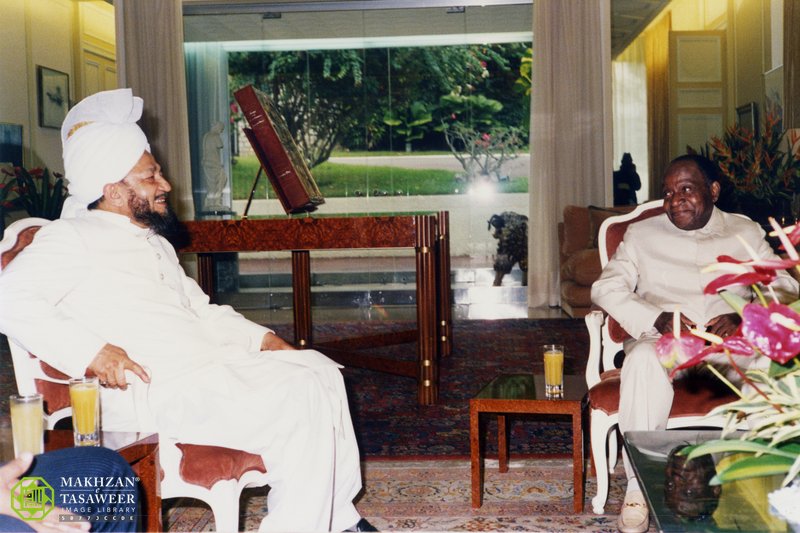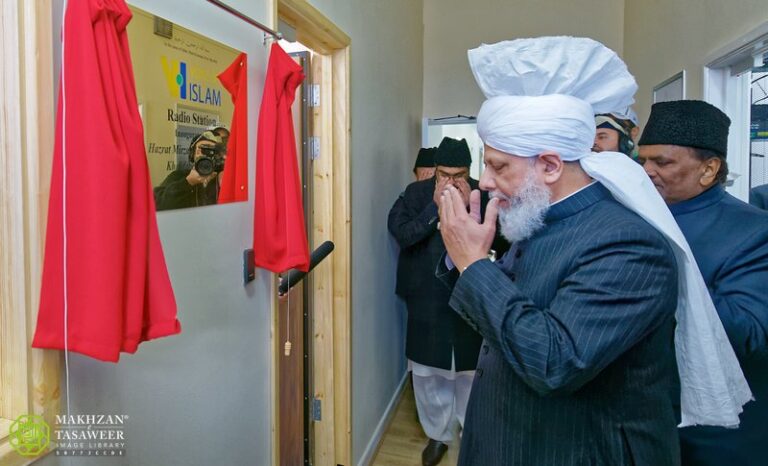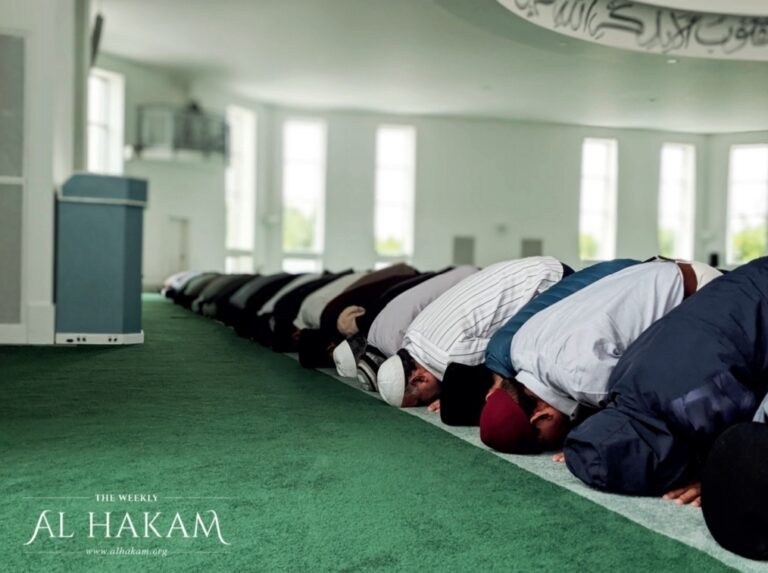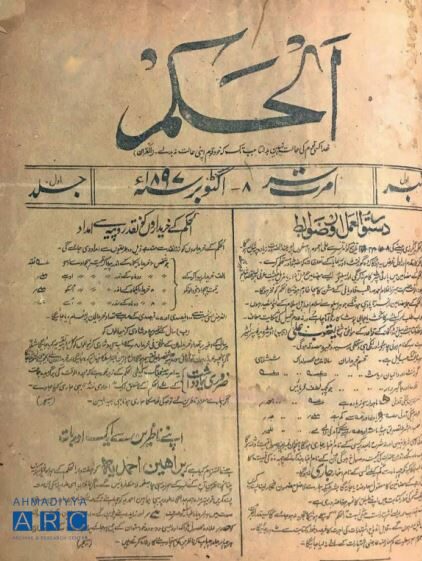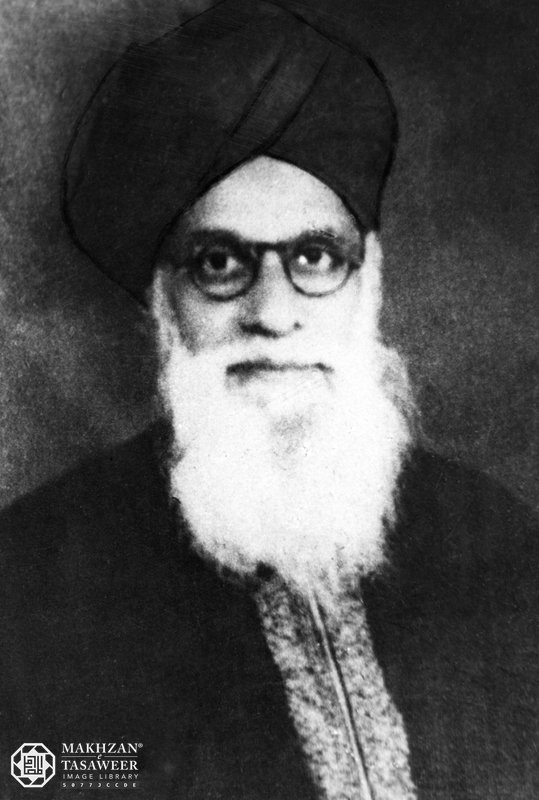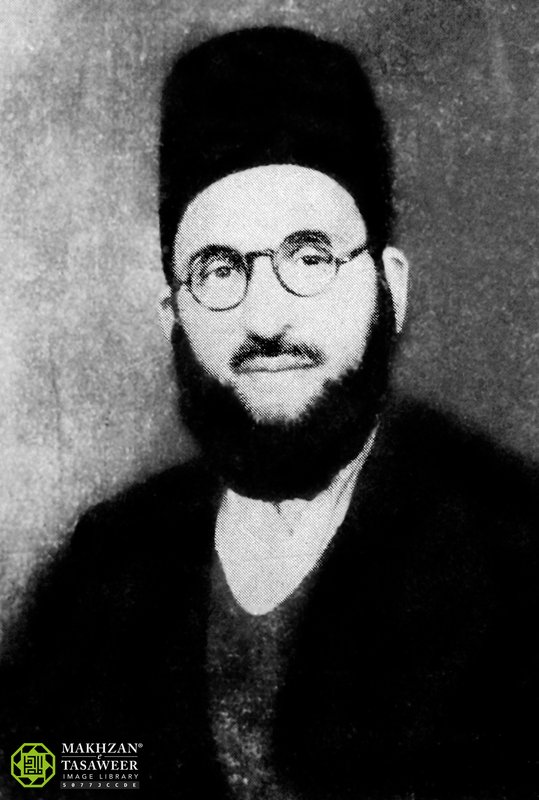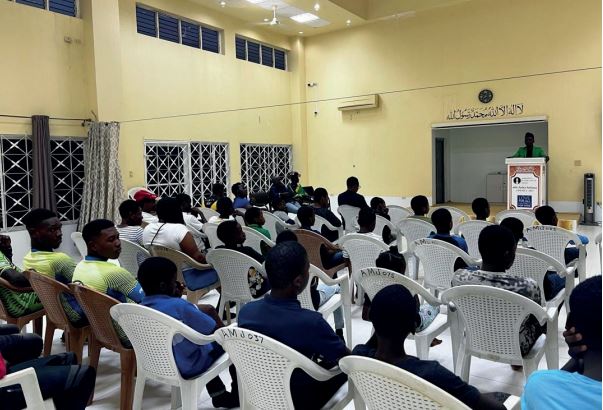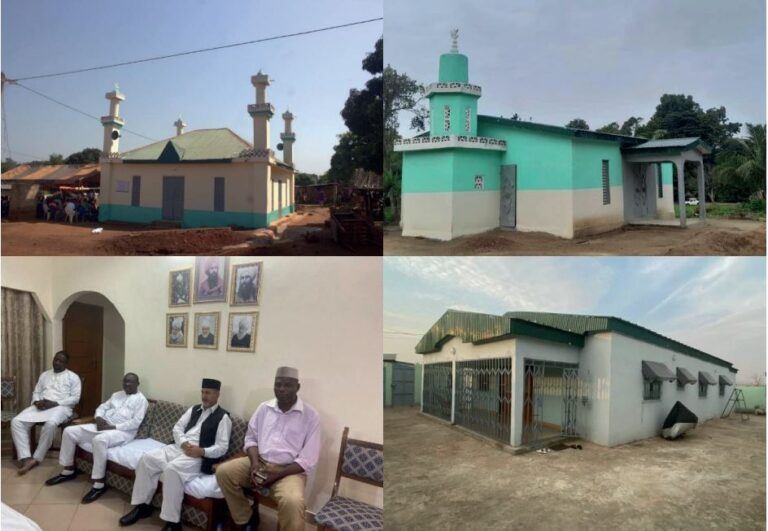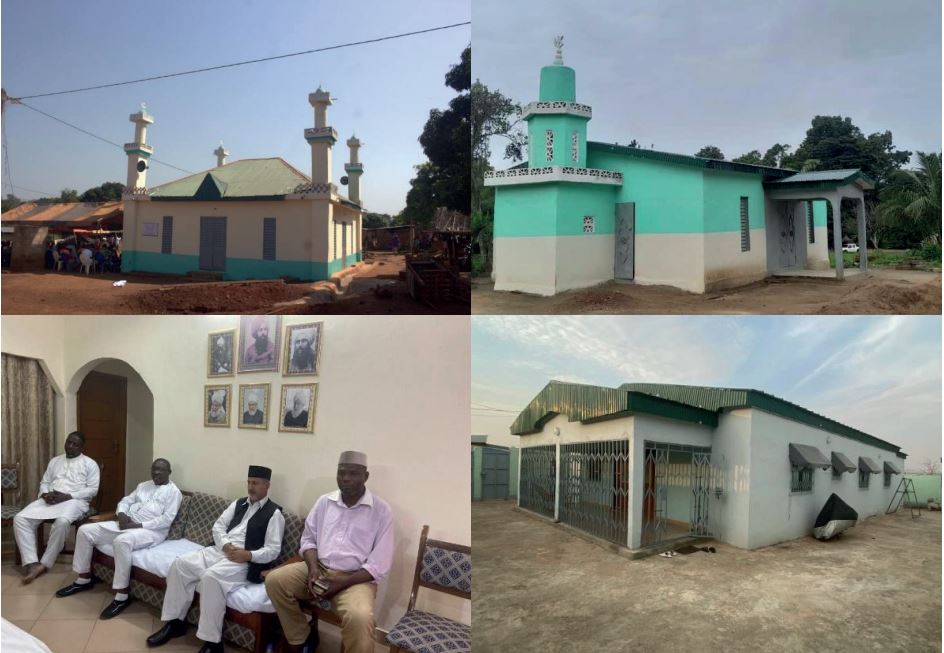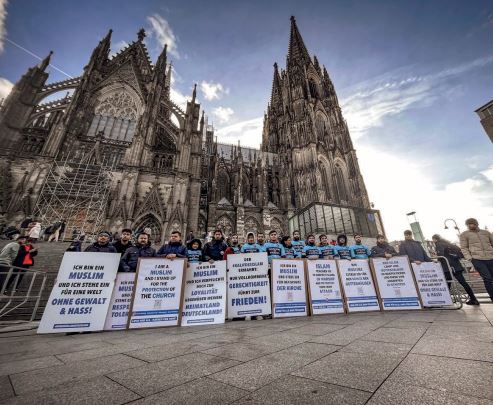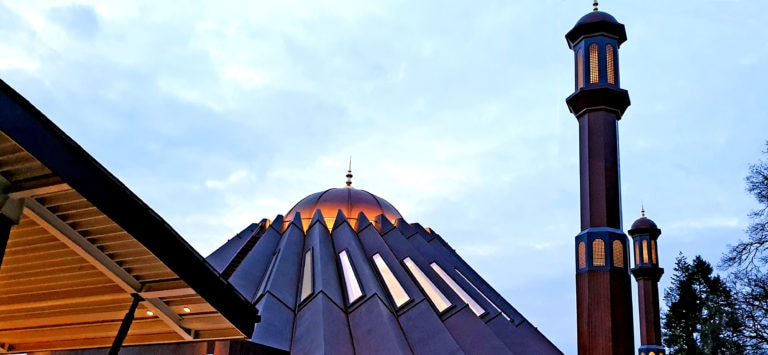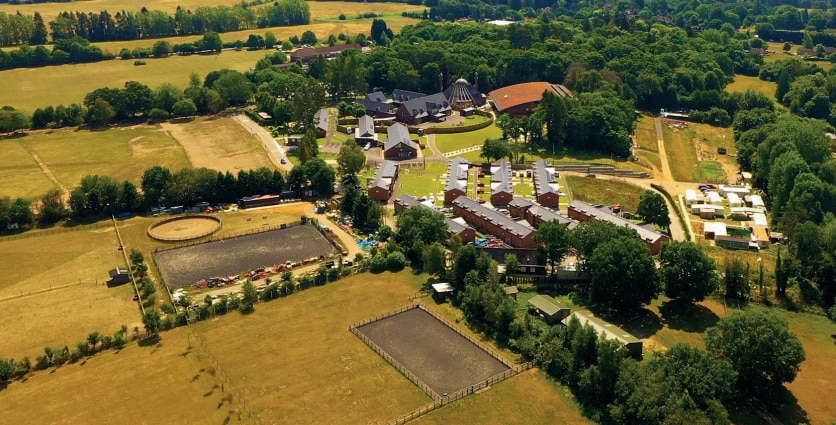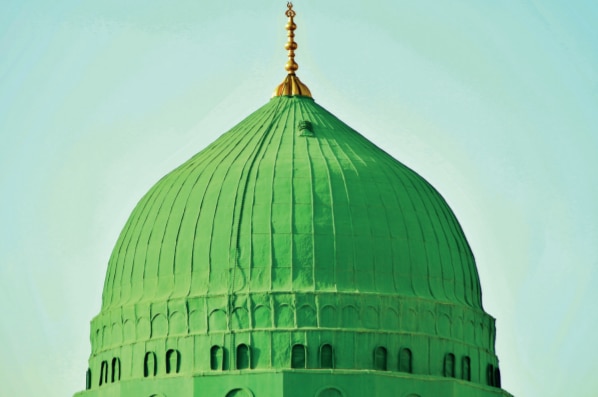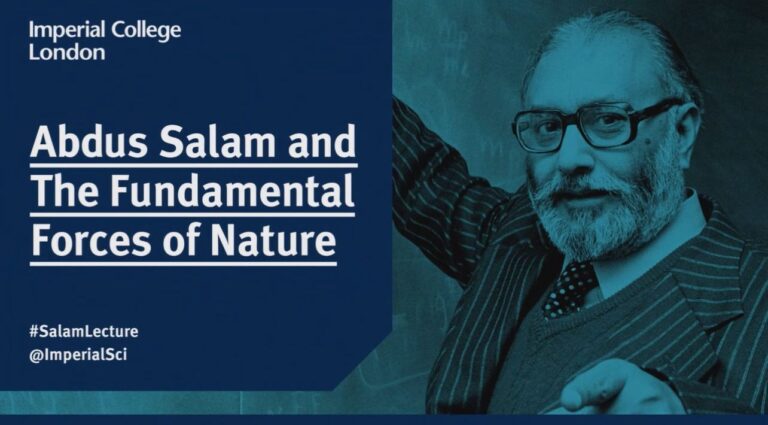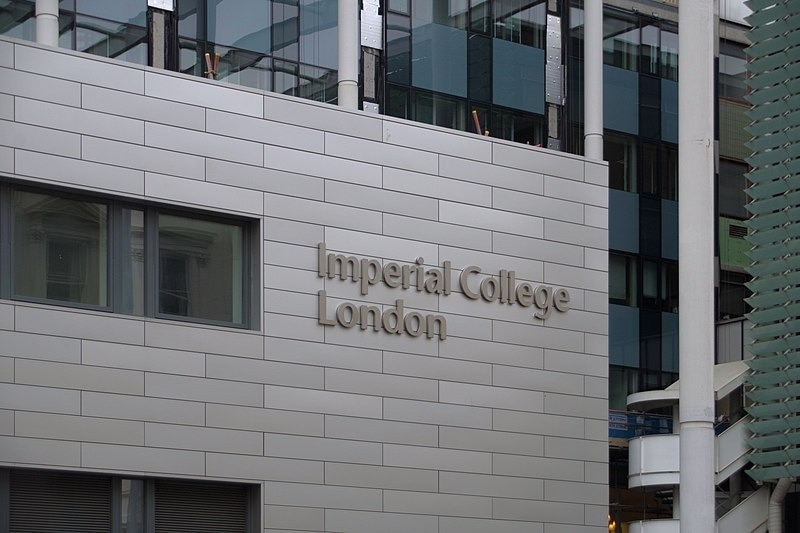Friday Sermon
5 January 2024
Spending in the Way of Allah: Waqf-e-Jadid 2024
After reciting the tashahhud, ta‘awwuz and Surah al-Fatihah, Hazrat Khalifatul Masih Vaa recited verses 11-13 of Surah as-Saff and stated:
The translation of the verses is as follows:
“O ye who believe! Shall I point out to you a bargain that will save you from a painful punishment? That you believe in Allah and His Messenger, and strive in the cause of Allah with your wealth and your persons. That is better for you, if you did but know. He will forgive you your sins, and make you enter the Gardens through which streams flow, and pure and pleasant dwellings in Gardens of Eternity. That is the supreme triumph.” [Surah as-Saff, Ch.61: V.11-13]
On one occasion, the Promised Messiahas stated:
“I have also been sent in similitude to the Messiah of the Mosaic dispensation. Just as Hazrat ‘Isaas taught mercy and forgiveness, I too have been sent as the Messiah of Muhammadsa with the Islamic teachings of mercy, forgiveness, peace, and reconciliation, and I have come to end religious wars. This era is the era of propagating the teachings of the Holy Quran and not that of Jihad with the sword.” (Arba‘een, Ruhani Khazain, Vol. 17, p. 344)
Rather, a Jihad of the pen and tabligh [propagating the true teachings of Islam] is taking place in order to spread the teachings of Islam. And to maintain this Jihad requires the same sacrifices of one’s life, wealth, time and honour as were required in the early era of Islam.
Great endeavours are being made in this era around the world to acquire economic superiority; people have forsaken religion and are increasingly inclining towards materialism. The world is trying its utmost to establish its dominance in trade and to acquire worldly luxuries. In light of such circumstances, for the sake of spreading the religion, sacrifices are the very means and the best means of trade in order to gain the nearness of Allah the Almighty, just as Allah the Almighty has stated. This is exactly what Allah the Almighty has mentioned in the verses I recited. Hence, this is the era of the Promised Messiahas. In this era, a Jihad of financial sacrifices in particular is of great importance. This also develops an inclination towards sacrificing one’s ego and enables a person to gain the pleasure and nearness of Allah the Almighty. Allah the Almighty has drawn attention to financial sacrifices on multiple occasions in the Holy Quran. In one place, God says:
وَمَا لَكُمۡ أَلَّا تُنفِقُواْ فِي سَبِيلِ ٱللّٰهِ
“And why is it that you spend not in the way of Allah.” [Surah al-Hadid, Ch.57: V.11]
Allah the Almighty says that everything comes from Him, He provides for you all. And in order to reward one, He tells you to spend in His cause. Hence, if you have faith and conviction in Allah the Almighty then this demands that you offer sacrifices in His cause. On another occasion, Allah the Almighty says in admonishment:
وَأَنفِقُواْ فِي سَبِيلِ ٱللّٰهِ وَلَا تُلۡقُواْ بِأَيۡدِيكُمۡ إِلَى ٱلتَّهۡلُكَةِ
“And spend in the cause of Allah, and cast not yourselves into ruin with your own hands.” Hence, those who do not spend in the cause of Allah the Almighty out of what He has given them cast themselves into ruin.” [Ch.2: V.196]
Nowadays, it is this very Jihad of one’s wealth that becomes the means for the Jihad of the self. A person pushes many of their desires aside and makes sacrifices for the sake of the progress of their faith. Thus, this is the Jihad of the self. Whilst attracting the grace of Allah Almighty, He will, in turn, make them and their progeny the recipients of countless blessings. Allah the Almighty does not remain indebted to anyone. He has pointed out a bargain that is beneficial both in this world and the next, a bargain that will save one from hellfire. The benefit of worldly transactions is limited to this world, but the transaction with Allah the Almighty makes one deserving of the blessings of this world and the hereafter. As I have mentioned, Allah Almighty does not remain indebted to anyone. In fact, He gives back manifolds to one who sacrifices in His path out of pure intentions. Allah Almighty states in one place in the Holy Quran:
وَمَثَلُ ٱلَّذِينَ يُنفِقُونَ أَمۡوَٰلَهُمُ ٱبۡتِغَآءَ مَرۡضَاتِ ٱللّٰهِ وَتَثۡبِيتٗا مِّنۡ أَنفُسِهِمۡ كَمَثَلِ جَنَّةِۭ بِرَبۡوَةٍ أَصَابَهَا وَابِلٞ فَـَٔاتَتۡ أُكُلَهَا ضِعۡفَيۡنِ فَإِن لَّمۡ يُصِبۡهَا وَابِلٞ فَطَلّٞ ۗ وَٱللّٰهُ بِمَا تَعۡمَلُونَ بَصِيرٌ
“And the case of those who spend their wealth to seek the pleasure of Allah and to strengthen their souls is like the case of a garden on elevated ground. Heavy rain falls on it so that it brings forth its fruit twofold. And if heavy rain does not fall on it, then light rain suffices. And Allah sees what you do.” (Ch.2: V.266)
Today, it is the Ahmadis who truly understand the importance of making financial sacrifices for the sake of one’s faith. Like light rain, if they even give small amounts of wealth, Allah the Almighty makes that yield innumerable fruits. The progress of the Jamaat itself bears testimony to this. The poor are those who make [seemingly] small sacrifices, yet Allah the Almighty makes those yield countless bounties. It has generally been observed that the poorer Ahmadis with fewer means are the ones who offer greater sacrifices. There are so many examples of this. From time to time, I narrate such examples, and I shall also present some today. These examples should serve to draw the attention of those Ahmadis who are better off, and make them realise what their standard is. When a less fortunate Ahmadi makes a financial sacrifice, they are performing the Jihad of their self.
There are countless such Ahmadis who make sacrifices in Africa, in Pakistan and in India, who give up their food and remain hungry as they make financial sacrifices. When they are sick, they give precedence to giving alms instead of purchasing medicine for themselves or for their children. But Allah the Almighty does not leave them without reward for this sacrifice, rather at times, they receive the blessings of Allah so swiftly that it leaves one astounded, and this in itself serves as a means of increasing their faith.
Therefore, any Ahmadi of weak faith should never entertain the thought for even a moment that Allah the Almighty does not reward the sacrifices made out of pure intentions. The treasures of Allah the Almighty are boundless. He has no need for our alms or money. The sacrifices that Allah the Almighty calls upon us to make are to grant us the opportunity to receive His grace.
The Promised Messiahas has instilled such a spirit of sacrifice in his Jamaat, that from his era until today, we continue to witness such incidents of members of the Jamaat placing their needs aside as they make sacrifices for the sake of the requirements of the Jamaat, and this is the hallmark of nations that excel, and it is as a result of this that Allah the Almighty showers His blessings. The believers are those who understand the instruction of the Holy Prophetsa when he said, “Safeguard yourselves from hellfire, even if you can only do so by purchasing half a date.” (Sahih al-Bukhari, Kitab az-zakat, Hadith 1417). Even if one can only afford half a date, they should give that in order to protect themselves from the fire.
The Holy Prophetsa also stated, “Abstain from miserliness. It is miserliness which destroyed nations of the past.” (Sunan Abi Daud, Kitab az-zakat, Hadith 1698).
The state of the companions was such that they would say, “Whenever the Holy Prophetsa would encourage us to make financial sacrifices, we would go to the markets, carry out whatever small amounts of work was available, and we would bring back whatever we earned to present it before the Holy Prophetsa.” (Sahih al-Bukhari, Kitab-ul-Zakat, Hadith 1416). Allah the Almighty also granted people who make such sacrifices to the True Servant of the Holy Prophetsa [i.e., the Promised Messiahas], and there are countless such examples. We find in history the mention of some brothers who made such sacrifices that leave one amazed, and the Promised Messiahas even mentioned them. He stated:
“I am amazed at the love and sincerity shown by my Jamaat, even those with meagre incomes, such as Mian Jamaluddin, Khairuddin, and Imamuddin of Kashmir, who live near our village. These three brothers of meagre means, who work as labourers and perhaps earn 3-4 anas a day, give in monthly donations with great zeal. I am also amazed by the sincerity of their friend Mian Abdul Aziz Patwari, who, in spite of his low income, one day gave 100 rupees with the desire for it to be spent in the way of Allah. This poor person may have saved up the 100 rupees for several years, yet his passion for faith kindled the pleasure of Allah.” (Zamima Risalah Anjam-e-Atham, Ruhani Khazain, Vol. 11, pp. 313-314 [footnote])
Thus, the names of those who sacrificed are recorded in the history of the Jamaat. These people who have a strong desire to attain the pleasure of Allah – whether they may have made small sacrifices or large – their names have been added to the helpers of the Promised Messiah’sas mission, and history has recorded it. I shall mention another elderly man. He was disabled and poor; his name was Hafiz Muinuddin Sahib. He possessed a great deal of passion to serve and render sacrifices for the Jamaat, even though he made ends meet with great difficulty, and because he was disabled, he wasn’t able to work either. Deeming him to be an elderly servant of the Promised Messiahas, some people would give him gifts, but it was the rule of Hafiz Sahib that whatever he would receive as a gift, he would never spend it on his personal needs; rather, he would offer it in service of the Jamaat, and in service of the Promised Messiahas. And there was never any financial scheme of the Promised Messiahas in which he did not take part, though he may have donated one Paisa; still, he would surely take part. In this day and age, you can consider one Paisa to be equivalent to one penny, but nonetheless, he would take part.
In light of his circumstances, this seemingly insignificant sacrifice was, in fact, a great sacrifice, and often times it would also come to pass that Hafiz Sahib would go hungry in order to offer this sacrifice. (Ashab-e-Ahmad, Vol. 13, p. 293)
These were the people who were always ready to sacrifice everything in order to attain the pleasure of God Almighty. Allah the Almighty expressed His pleasure at their sacrifices, and planted those trees from which their progeny is now eating. Thus, those people who are the offspring of these pious elders and companions should always keep in mind that if the grace of Allah the Almighty is with them today, then it is because of the sacrifices of those whom Allah the Almighty blessed with difficulties. They should examine themselves to see if, for the sake of the Jamaat, and for the sake of furthering the mission of the Promised Messiahas, the levels of their sacrifices increasing with the same thought process that their elders had in mind. Even now, in the Ahmadiyya Jamaat, the majority of people are poor, yet they display the highest standard of sacrifice. Thus, whoever is affluent in the Jamaat should examine themselves. Allah and His Messengersa value these righteous sacrifices, just as,w in one instance, the Holy Prophetsa said:
“‘One dirham has exceeded one hundred thousand dirhams today in value.’ The companions asked, ‘How is this possible?’ The Holy Prophetsa replied, ‘a man had two dirhams today, from which he sacrificed one dirham, while another man had a vast amount of wealth and land, from which he sacrificed one hundred thousand dirhams.’” (Sunan an-Nisai, Kitab-ul-Zakat, Hadith 2528). One hundred thousand dirhams appear to be a very large sum of money, but in comparison to the poor man’s passion for sacrifice, the one hundred thousand dirhams are of no significance in the sight of Allah the Almighty. Thus, the degree of sacrifice in the sight of Allah the Almighty relates to passion and proportion, not amount.
There are those who say that the Jamaat takes chanda from the poor, and some people also write to me about this sometimes; this is not right. These people are themselves lacking [in their faith]. These are their own worldly priorities, and they use the names of others to fulfil their own desires. By the grace of Allah the Almighty, the majority of the Jamaat today are those who make sacrifices. Keeping in mind the sacrifices of the companions of the Holy Prophetsa, they too want to make their own sacrifices, and do so without being asked to. Acting in accordance with the sacrifices made by those righteous souls in the time of the Promised Messiahas, we also see these examples in this age. As I have said, accounts are sent in reports, and I mention some of them as well. They offer an astonishing amount of financial sacrifice. There are such righteous souls who live in far-off countries within Africa, who wish to be helpers and assistants of the Promised Messiahas in order to spread Islam and grant victory to their faith. These are the people who make sacrifices while keeping in mind this quote of the Promised Messiahas in which he said:
“It is not possible for you to love wealth as well as to love Allah. You can love only one of the two. Fortunate is he who loves Allah. If any of you loves Him and spends their wealth in His cause, I am certain that their wealth will increase more than that of others, for wealth does not come by itself; rather, it comes by Allah’s will. Whoever parts with some of their wealth for the sake of Allah, will surely get it back.” (Majmu‘ah-e-Ishtiharat, Vol. 3, p. 497)
This is the quote of the Promised Messiahas. We see examples of this even today, as to how people sacrificed in the way of God, and how God immediately returned it to them. Everyone works in the same place and same environment, but Allah the Almighty blesses the wealth of the Ahmadi, while others do not receive this blessing, and this phenomenon then becomes the reason for their ever-increasing faith. As I said before, I shall present a few examples of such righteous people.
In the Republic of Central Africa, there is a place called Vdambala, where there is a recent convert named Isa Sahib. He says, “I took the Bai’at nine months ago. In 2016, I had a plot of land that I had bought in order to make a house, but I was not able to collect sufficient funds to build the house. I joined the Jamaat and heard about the blessings and importance of offering chanda. Whatever small sacrifice I could offer in the way of God, I would do so, and I would always hear that Allah the Almighty makes things easier through this [sacrifice], and grants success in one’s personal and financial life.” Furthermore, he says: “A thought came into my heart that when we were non-Ahmadi, we did not give chanda in the way of God even once, nor did anyone even tell us about this; so now I have been told.” The new converts are usually told about the Tahrik-e-Jadid Scheme and the Waqf-e-Jadid Scheme. He says, “I was informed of this. I offered 1500 CFA in the Waqf-e-Jadid Scheme, and God Almighty gave its reward in such a way, that a friend sent a present of 10,000 bricks to be made for my house, and then made the bricks for me.” Over there, they make it themselves (the blocks) out of cement. “In this way, the construction of the house began for which he had been waiting many years, and the house was completed as well.” Then he says, “I am certain that this happened by the grace of Allah the Almighty. Otherwise, I did not have this ability within me, and it would’ve been impossible for me.”
Kazakhstan is among the former Soviet states. Daurin Sahib lives there and says, “A few days ago I received a message from the mu’allim saying that my wife’s contribution towards Waqf-e-Jadid this year was very little and was at the bottom of the list and that if possible she should offer at least five thousand tenge. I considered that my wife was expecting and was also due to undergo an operation and so it would be better if I contributed fifteen thousand tenge. As soon as I sent the amount, I received a message from the school that since I also look after an orphan and I have many children, the government decided to grant a hundred thousand tenge. It was faith inspiring for me to see how Allah the Almighty immediately gave me something in return.”
Urmat Sahib is from Kyrgyzstan, another [former Soviet] state. He works in a gold mine and offers his financial contributions every six months. Last year, when he offered his contributions for the second half of the year, he gave six thousand Kyrgyzstani Som (the currency there) more than the prescribed rate. When asked why, he said, “Prices have increased in the entire world, which would have increased the Jamaat’s expenses as well, and so I increased my contribution from the prescribed rate.” This year, as well, when he offered his contributions for the first half of the year, he increased them by another six thousand Som. In this way, he increased his contribution by about 40 per cent.
These are examples of Allah’s will and seeking His pleasure. No one made an appeal for him to do so, but in light of the needs, he strove on his own to increase his contribution. People say that we ask [for contributions]. We do not ask; we simply convey the message of Allah the Almighty to make sacrifices in the way of Allah.
The Philippines is another far-off country. The missionary there says, “The Sadr Majlis Khuddam-ul-Ahmadiyya told me that he offered his Waqf-e-Jadid contribution according to his pledge but the fiscal year was coming to an end and he had a desire to contribute more than he had pledged. Hence, he offered another thousand pesos on behalf of his deceased parents and father-in-law towards Waqf-e-Jadid. During those days, he was working on a contract in the local municipal offices as a risk reduction manager. After the break for the new year, as soon as he went back to work, the local mayor made his position permanent and doubled his salary. He had been working on a contract for the past four years and despite his persistent requests, his job would not be made permanent. Now he says that he is convinced that this is the fruit of the sacrifice he made and God Almighty certainly bestows upon us beyond our imagination.”
Cameroon is a country in Africa, and the missionary there says, “A young man named Yusuf accepted Ahmadiyyat. He is a poor man and transports people on his motorcycle. Muhammad Yusuf says, ‘When I accepted Ahmadiyyat and, upon the advice of the missionary, I started offering financial contributions, gradually my circumstances began to change. My heart is extremely content, and my life has started to become easier.’” In essence, contentment of the heart is everything. He says, “I am content with offering financial contributions. Now, it is my intention to contribute not only to Waqf-e-Jadid but to take part in all the various financial contributions because there are blessings for me and my family in doing so. It is due to the blessings associated with the Imam Mahdias that I have found spiritual peace; I am very happy and content.” These are the ways in which Allah the Almighty procures means for help.
Tanzania is a country in East Africa. A young man from the Ruvuma Region named Milawe Sahib says, “I am twenty-seven years old. I have witnessed many blessings due to financial contributions.” He says, “I am a farmer and this year, I swiftly sent my crops to the relevant department with the intention of offering my contribution for Waqf-e-Jadid, and so I sent the harvest to the government.” He says, “Had I waited a few more days, then I might have been able to sell my crops at a higher price, but then I would not have been able to offer my financial contribution as the deadline would have passed.” He says, “In any case, when I contacted the department, I received a higher price than what farmers were receiving on average for their crops, and I used that to offer my contributions for Waqf-e-Jadid. The department said, ‘People withhold their crops so that they can get a better price. You have been rewarded for your trustworthiness.’” He says, “I believe that Allah rewarded me for my intention so that I may easily sacrifice in His way.”
Rozamamat Sahib is from Kyrgyzstan. He says about financial contributions for Waqf-e-Jadid, “It is extremely important, and the way I was introduced to it is quite interesting. I remember that when I was introduced to the Ahmadiyya Jamaat, I asked the missionary about who pays for all of the Jamaat’s expenses. He explained to me in detail about the work that the Jamaat does, the system of Khilafat and then the various schemes such as Waqf-e-Jadid and other forms of financial sacrifice.” He says, “I had never seen or heard of a financial system like this. This was the first time I heard about this kind of system. Then, after pledging allegiance during the era of Hazrat Khalifatul Masih IVrh, I started offering financial contributions every month and have seen the blessings of offering financial sacrifices throughout my life. Before joining the Jamaat, I lived in a flat with my family, which we rented. We were living under difficult circumstances. I worked at different places. We were in a state of poverty. We didn’t have any property or a consistent source of income. All praise belongs to Allah because, through the blessings of offering financial contributions, I have built an entire house. I currently have a stable income; my work is not difficult, and it pays well. These are blessings bestowed by Allah the Almighty due to offering financial contributions.”Togo is a country in West Africa. The missionary in-charge there says, “An Ahmadi woman did not have the money to offer her contributions for Waqf-e-Jadid. She had planted some vegetables for household use. She sold the vegetables in the market and offered her contribution to Waqf-e-Jadid, thereby fulfilling the pledge she made to God.” This was a small deed, yet it exemplifies the actions of companions who would work in markets or individuals like Hafiz Sahib, who would donate any gifts he received.
Similarly, another member named Hamzah Sahib did not have the money to offer his contribution to Waqf-e-Jadid. He had some chickens; he sold nine of them and thus offered his contribution. These people who are poor offer sacrifices for the sake of Allah the Almighty, and these are the very people who rekindle the memory of our elders.
Iman Hidayat Sahib from Indonesia says, “I am a born Ahmadi; I used to offer financial contributions simply as a member [of the Jamaat] (it was like a habit; he was an Ahmadi and he had to offer financial contributions). I did not take part in the Tahrik-e-Jadid and Waqf-e-Jadid schemes. Upon this, all my brothers encouraged me to take part in both schemes and said that we should not offer financial contributions just as mere members of the Jamaat, rather we should take part in offering financial sacrifices in order to attain the nearness of Allah.” He says, “Hence, I developed an interest in taking part in the Tahrik-e-Jadid and Waqf-e-Jadid schemes, and so I started making financial sacrifices for both. After starting to take part in both of these schemes, I noticed a massive change in my life. I feel as if I am closer to Allah the Almighty. I have also been given responsibilities in the Jamaat. Similarly, Allah the Almighty has shown His love when it comes to my wealth. Above all, through the blessings of financial sacrifices, I have seen the fulfilment of the statement made by Allah the Almighty, ‘If you walk towards Me, I will run towards you.’”
A member from Melbourne, Australia, writes his own account, saying: “A few weeks before the Waqf-e-Jadid financial year ended, the members were encouraged that whoever has the means should try to give at least 5,000 [AUD] dollars. I had given 4,000 AUD for Waqf-e-Jadid already. I did not have 5,000 AUD, but deep down, I had a strong desire to offer 5,000 AUD for Waqf-e-Jadid. Thus, on my return from the Friday sermon, I began praying for this.” He was living in good conditions, but despite this, he had the fear of God in his heart. He had a desire and yearning, and so he was moved to pray for it.
He further says: “I have a small business of my own. One day, I stepped outside the office for a short break and began praying to find a solution to how I can partake in this scheme, and that may Allah the Almighty bestow me this opportunity. When I went back into the office, my business partner, who is a Christian, came to the office and closed the door. He shook my hand jubilantly and said that he had some great news. Expanding further, he said that they secured a new customer for their business who had requested to [assist in] arranging this for him. The fees would be 30,000 AUD, which would be split between them, 15,000 AUD each.” He further says: “I immediately understood that my prayer had been answered. I explained to my business partner how I was seeking help from Allah the Almighty, and I was convinced that this was a result of my prayer. Upon this, my business partner said: ‘5,000 for charity is a large amount. I also benefited from your prayer and so I will also contribute. I will give half of the amount you want to give.’ However, I explained to him that there were plenty of other charitable schemes which he could take part in. The 5,000 AUD was for Waqf-e-Jadid which I have to give myself. Nonetheless, Allah the Almighty blessed me greatly through accepting my prayer and my desire.”
Fiji is another distant country. A new convert by the name of Zainul Baig Sahib pledged allegiance two or three years ago. Initially, when he was included in the [Waqf-e-Jadid] scheme, he pledged a small amount. After a short while, he was included in Chanda-e-Aam. However, this year, after listening to my sermons, he learned about the importance of the scheme. He himself increased his promises in Tahrik-e-Jadid, Waqf-e-Jadid etc., and paid tenfold the amount. Similarly, he promised to pay 1/16 for Chanda-e-Aam on his weekly income. Now each week he comes regularly and pays all of his contributions. The new convert [Zainul Baig] states: “Ever since I have been paying my chanda regularly, I have gained a promotion in my job, and from January 2024 my pay will also increase, God willing. If anyone wishes to learn about the blessings of giving chanda, they can ask me.”The missionary of Micronesia, Sharjeel Sahib, says: “A new convert, Simon Sahib, was reminded about offering financial sacrifices and informed that we give chanda for the sake of gaining Allah’s pleasure and that it is not a tax; God Almighty has declared it to be a ‘goodly loan’. Upon this, the gentleman began giving chanda each week. After some time, he said: ‘Previously, when I would go to church and give money, I would never notice any difference in my life. However, after joining the Jamaat and ever since I have been giving financial contributions in the way of Allah the Almighty, all my needs are fulfilled in a manner that leaves me astounded. At times, I am in need of money, and all of a sudden, someone comes and hands me money. Whenever there is a shortage of food, even if I am sitting at home, Allah the Almighty fulfils my need from somewhere.’ By the grace of Allah, Simon Sahib gives chanda above and beyond his means.”
Amir Sahib of Tanzania writes: “Bashir Sahib paid 40,000 shillings towards Waqf-e-Jadid for himself and his family. His wife asked why he had given such a large amount even though their household circumstances were not good. He replied by saying: ‘Do not worry. Allah the Almighty never allows the one who offers financial sacrifices in His way to go in vain. Undoubtedly, He returns it back manifold.’ A few days after this, he got work from several different places through which he not only earned back what he had contributed, he in turn made more money.” He further says: “I already had an understanding [of the blessings], but now my wife is a witness to the blessings of giving chanda. This was a means for her to increase in her faith.”
Secretary Waqf-e-Jadid of Jamaat Germany says:
“A student from the Mainz local Jamaat applied to his local authority for an allowance. He needed some money for his studies. He mentioned that he needed the fees as his semester was about to start and he did not have enough. At the same time, the year for Waqf-e-Jadid was ending, and he had yet to pay promises for himself and his family. As he had applied for it he was hopeful that the local authority would approve his application. However, it was rejected. Putting his trust in Allah, he gave the amount he had [saved up] towards chanda. After this, he completed his semester, and Allah the Almighty enabled him to get good grades. Out of nowhere, the relevant authority – which had previously rejected his request – put 4,000 euros into his account.” He says that it was his belief that this was due to his financial sacrifice.
Siraj Sahib is an Ahmadi from Samit Wari, India. He writes: “I have seen the blessings of offering financial sacrifice with my own eyes. I was unable to pay my Waqf-e-Jadid promises owing to the Covid pandemic.” For two or three years, the wood in his field was being damaged due to rain. A person had agreed to buy them and even set an amount for it, but he did not pay the money. Nonetheless, he continued searching for other people to buy the wood but with no luck. He says that the Secretary for Waqf-e-Jadid came and asked for chanda. He immediately gave him 2,000 rupees. Siraj Sahib says: “Within two days of this incident, the person who had agreed to buy the wood but was not taking it, suddenly came. He paid 20,000 rupees and took all of it.” He says: “It is my belief that owing to the blessings of giving chanda, the 2,000 rupees that I gave, Allah the Almighty returned it to me in the form of 20,000. Otherwise, the goods that were being wasted for such a long time could easily continue to be wasted.”
A member of Lajna from Canada says that last year, when I announced the New Year for Waqf-e-Jadid, she also desired to give chanda towards this and on behalf of her children as well. However, when she checked her bank account, there was no money in it, and so she prayed to Allah the Almighty to produce some means from the unseen so she could pay her chanda. After a few days, when she checked her bank account, she had 300 dollars which was roughly the same amount she needed to pay her own chanda and on behalf of her deceased relatives. She immediately paid her chanda and expressed her gratitude to Allah the Almighty.
Another female member from Canada increased the amount she had promised in chanda and also completed the payment. The next day, she received a cheque from the tax/revenue department for an overpayment of 750 dollars. She says that this was the same amount she had paid towards her chanda.
Amina Sahiba is a new convert from Tanzania. Upon accepting Ahmadiyyat, she said, “I saw a completely different organisation in the Ahmadiyya Jamaat as compared to all other Muslims. In the financial system [of the Jamaat], they provide a receipt for every chanda and this is not seen anywhere else. In November, the mu’allim [local missionary] delivered the Friday sermon and drew attention towards the chanda of Waqf-e-Jadid. I gave all the money I had at the time towards chanda. My household circumstances were not good and my daughter was also expecting. So, we would need to go hospital at any time. When I reached home, I received a phone call in the evening from someone who had borrowed some money from me two years ago but had not been in contact since. I also lost any hope of it being returned. In any case, they phoned, apologised and explained the reason for the delay and then returned the 2,000 [shillings].”
She says that she had made a financial sacrifice whilst completely forsaking her personal needs, and Allah the Almighty helped her. Later, she also urgently needed to take her daughter to the hospital, and Allah the Almighty bestowed His grace, and she was also able to receive treatment. Thus, Allah the Almighty is also instilling this thought among those who have newly joined the Jamaat, which is that wealth comes from Allah the Almighty, and this type of thought can only be found amongst Ahmadis.
Niger is also a country [in Africa] and the circumstances of the country are not good. The mu’allim says, “We visited a village in Maradi Region and drew the attention of the members towards chanda, and people took part in Waqf-e-Jadid according to their means. Upon this, a non-Ahmadi commented, ‘You are taking money from the poor people of our village even though you are well aware that the economic situation of the country is in a terrible state. While other Muslim organisations come and give provisions, you, on the other hand, are asking from them.’”
The mu’allim says, “Before I could even respond, an Ahmadi member from the village stood up and passionately said, ‘You are right, other Muslim organisations come and provide some help; however, has any Muslim organisation ever taught us about Islam? They do some charitable work and then leave, but it is only the Ahmadiyya Jamaat that teaches us about faith. The mu’allim has not come to take any money from us, in fact, he has come to inspire us to make the same financial sacrifices which the companions (may Allah be pleased with them) made in the time of the Holy Prophetsa through which we will not only attain the reward in this world but also in the hereafter.’”
This is the level of understanding that Allah the Almighty has instilled in them after accepting Ahmadiyyat. They understand that to attain the pleasure of Allah the Almighty, it is important to make sacrifices. In turn, they also receive countless blessings of Allah the Almighty. In any case, upon hearing this response, the non-Ahmadi fell silent.
Allah the Almighty has granted the Promised Messiahas such beautiful and sincere members from every part of the world. It is such a long list that it is difficult for me to decide which account I should narrate and which one to leave out. There are countless accounts, and due to time, I cannot relate them all. However, the ones I have not mentioned are not lacking in any way in their sincerity or devotion. They have offered these financial sacrifices in order to attain the pleasure of Allah the Almighty. And Allah the Almighty does not remain indebted to anyone; rather, He grants acceptance to their sacrifices and makes them a means of increasing their faith.
The Promised Messiahas states:
“My dear friends, I assure you that God Almighty has granted me true passion to have sympathy for you and I have been granted true insight in order to increase your faith and divine cognisance. You and your progeny are highly in need of this divine cognisance. Thus, I am standing ready for you to help with the religious tasks with your pure wealth. And every individual, in accordance to the ability, strength and capacity given to them by God Almighty, should not delay in this endeavour and nor should they give preference to their wealth over Allah the Almighty and His Messengersa. And as much as I possibly can, through the publication of literature, shall spread the knowledge and blessings to Asia and Europe which God Almighty’s Holy Spirit has granted me.” (Izala-e-Auham, Ruhani Khazain, Vol. 3, p. 516)Thus, through these financial sacrifices and the Promised Messiahas, the task of spreading Islam is underway. Despite the fact that the Ahmadis of Africa – who are poor and have little means – have established high standards of sacrifice, they cannot completely carry the burden of extensively spreading Islam in their nation. For this reason, the majority of contributions from more affluent nations, such as from Europe and America, towards Waqf-e-Jadid is spent on the growth of the Jamaat in poorer nations. May Allah the Almighty strengthen them in their faith and conviction, and bless the wealth and progeny of all those who offer sacrifices for the Jamaat in any way, and those who are always prepared to do so.
At this time, alongside the announcement of the start of the new year of Waqf-e-Jadid, I will also present an overview of the contributions made by different countries, as is tradition.
By the grace of Allah the Almighty, the 66th year of the Waqf-e-Jadid Scheme has come to its completion, and the 67th year has begun. With Allah the Almighty’s grace, the Ahmadiyya Muslim Jamaat contributed £12,941,000 for this cause in the past year, or approximately 13 million pounds. This collection exceeds last year’s collection by £718,000.
According to the overall collection, this year, the UK takes first place, followed by Canada. Canada has also considerably increased its contributions, as well as its participants. This is a great milestone for them this year. In third is Germany, and in fourth is the USA, followed by Pakistan, India, Australia, a country in the Middle East, Indonesia, another country in the Middle East and Belgium, respectively.
In Africa, Mauritius is first, followed by Ghana and Burkina Faso. Despite the difficult circumstances in Burkina Faso, the country is third in Africa. [After this,] there are Tanzania, Nigeria, Liberia, The Gambia, Mali, Uganda and Sierra Leone respectively.
In terms of the number of participants, 44,000 new pious individuals have joined their ranks, taking the total number to 1,550,000. For efforts in trying to increase the number of participants, Canada takes first place, followed by Tanzania, Cameroon, The Gambia, Nigeria, Guinea-Bissau, Congo Kinshasa, respectively.
For the top large jamaats of the Jamaat in the UK in collections, first is Farnham, followed by Worcester Park, Walsall, Aldershot South, Islamabad, Gillingham, Ash, Cheam South, Ewell and Hounslow South, respectively.
For the regions, first place is Baitul Futuh, followed by Islamabad Region, Midlands, Masjid Fazal, and Baitul Ehsan, respectively.
For the Daftar Atfal, the top ten Jama’ats are Aldershot South, Farnham, Aldershot North, Ash, Islamabad, Roehampton Vale, South Cheam, Manchester North, Birmingham West and Bradford South.
In the smaller jamaats, there is Spen Valley, Keighley, North Wales, North Hampton, and Swansea.
In the Imarat of Canada, first place is Vaughan, followed by Calgary, Peace Village, Vancouver, Brampton West and Toronto, respectively.
For the top large jamaats [of Canada], they are Milton East, Milton West, Hamilton, Edmonton West, Durham West, Ottawa West, Regina, Innisfil, Abbotsford, and Newfoundland.
For the Imarat Daftar Atfal [in Canada], the top Imarat is Vaughan, followed by Peace Village, Toronto West, Vancouver, Calgary and Mississauga, respectively.
For the jamaats in Daftar Atfal [in Canada], first place is Durham West, followed by Milton West, Hadiqah Ahmad, Montreal West, and Hamilton Mountain, respectively.
For the top Imarat in Germany, first place is Hamburg, followed by Frankfurt, Wiesbaden, Groß-Gerau and Riedstadt, respectively.
For the top ten jamaats [in Germany], first place is Rödermark, followed by Rodgau, Nidda, Friedberg, Flörsheim, Neuss, Mainz, Mahdi Abad, Osnabrück, Berlin and Koblenz, respectively.
For [the top jamaats in] the Daftar Atfal [in Germany], first place is Mannheim, followed by Diezenbach, Hessen South West, and Rheinland-Pfalz and Westfallen, respectively.
In the top ten jamaats of the USA, first place is Los Angeles, followed by Maryland, North Virginia, Seattle, Silicon Valley, Boston, Aston, Oshkosh, Minnesota, and Portland, respectively.
And for the Daftar Atfal [in the USA], there are Seattle, Los Angeles, Maryland, South Virginia, Cleveland, Aston, Silicon Valley, Oshkosh, Indiana, and Zion, respectively.
In Pakistan, the first place is Lahore, the second is Rabwah, and the third is Karachi. In terms of districts for the collection from adults, first place is Islamabad, then Faisalabad, then Gujranwala, then Gujrat, then Sargodha, then Umar Kott, then Multan, then Hyderabad, then Mirpur Khas, and then Dera Ghazi Khan.
For the top large jamaats in the Daftar Atfal [in Pakistan], the first is Lahore, the second is Rabwah, then Karachi in third.
For the positions of districts in the Daftar Atfal [in Pakistan], Islamabad is first, followed by Faisalabad, Narwal, Sargodha, Umar Kott, Gujranwala, Mirpur Khas, Gujrat, Hyderabad, and Sheikhupura, respectively.
Despite the stark drop in the value of the currency in Pakistan, they have made a huge increase in their contributions and offered a great sacrifice by the grace of Allah.
For the top provinces in India, first place is Kerala, followed by Tamil Nadu, Jamun Kashmir, Telangana, Karnataka, Odisha, Punjab, West Bengal, Delhi and Maharashtra.
For the top ten jamaats [in India] in terms of collections, first place is Hyderabad, followed by Coimbatore, Qadian, Kali Kott, Manjari, Bangalore, Malayapalayam, Calcutta, Kerolai, and Kerrang.
The top jamaats in Australia are Melbourne Langwarrin, Castle Hill, Marsden Park, Logan East, Melbourne Berwick, Penrith, Perth, Melbourne Clyde, Parramatta, and Adelaide West. May Allah the Almighty abundantly bless the wealth and progeny of all those who contributed.
I have been continuously reminding members to pray for Palestine. Remember the people there [in your prayers]. Continue to raise your voices for them in your immediate circles and speak to others in this regard, especially politicians, as I mentioned earlier. It does not seem that the government of Israel will desist from its cruelties. In fact, it has sent a message to its soldiers that the year 2024 is also a year of war. May Allah the Almighty bestow His mercy upon the Palestinians.
Now, it is also being said that there is a risk that the war will spread to a wider region, after which a world war could break out. They have started to bombard the area around Beirut as well; they continue to exceed and transgress. Although the American government is apparently calling upon them to limit their warfare, these seem to be mere words with no weight. These are weak and muted voices. It seems that their real plan is to drive out the Palestinians from Gaza and take over the land. May Allah the Almighty bestow His mercy upon the Palestinians and Muslims. May He enable the Muslims to come to reason and also to hearken to and accept the call of the Imam of the Age.
(Official Urdu transcript published in the Daily Al Fazl International, 26 January 2024, pp. 2-8. Translated by The Review of Religions.)
